
Date: 2025-01-08 Page is: DBtxt003.php txt00027825
US COMMUNITY
NEW CASTLE, PENNSYLVANIA
After backing Trump, low-income voters hope he doesn’t slash their benefits
Voters in the struggling Pennsylvania city of New Castle backed
Trump hoping he’d curb inflation. But the incoming president
will be under pressure to cut spending.
NEW CASTLE, PENNSYLVANIA
After backing Trump, low-income voters hope he doesn’t slash their benefits
Voters in the struggling Pennsylvania city of New Castle backed
Trump hoping he’d curb inflation. But the incoming president
will be under pressure to cut spending.
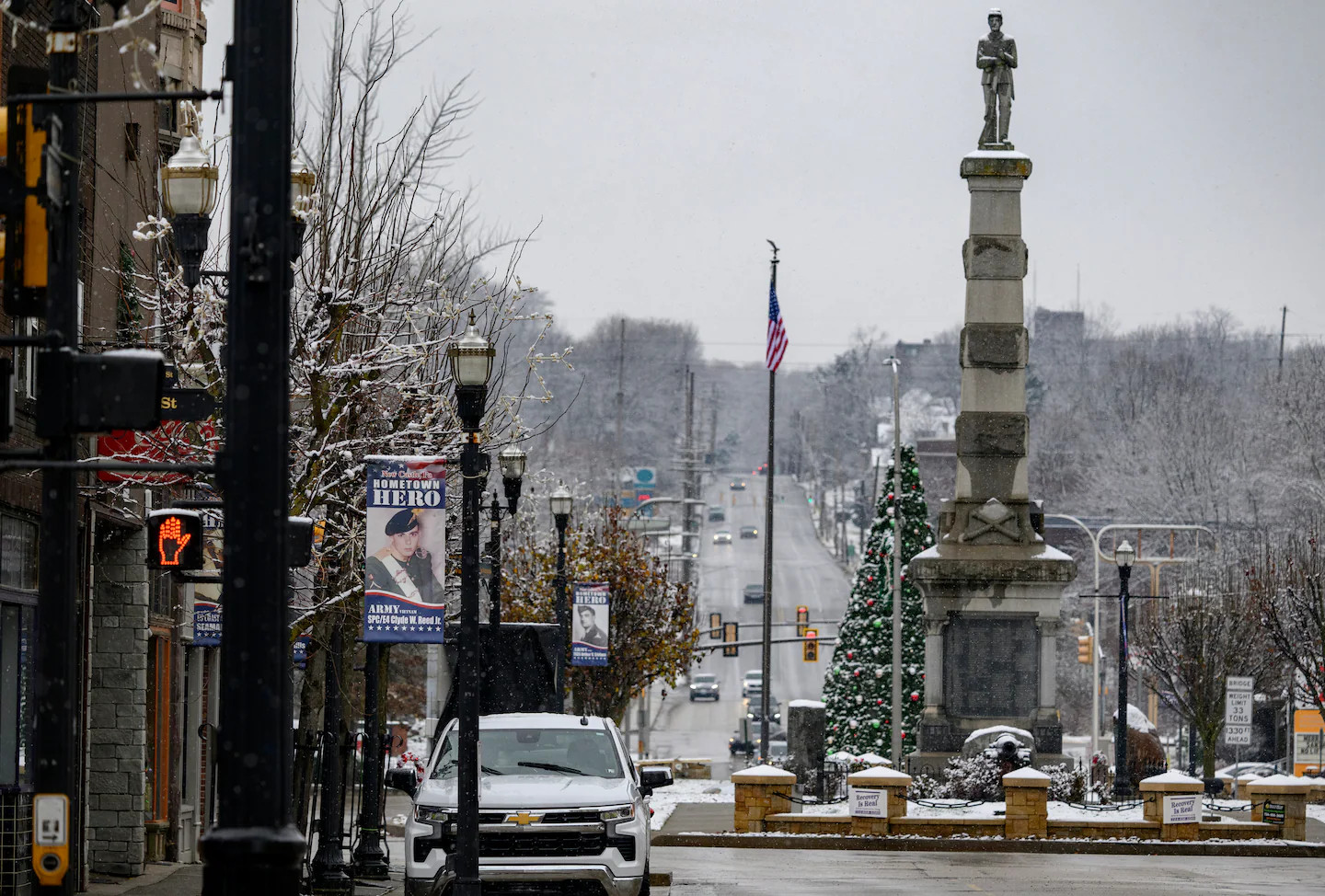
New Castle, Pennsylvania, on Dec 19th 2024.
(Jeff Swensen for The Washington Post)
Original article: https://www.washingtonpost.com/nation/2024/12/26/trump-voters-federal-benefits-food/
Peter Burgess COMMENTARY
I am not at all happy ... and it is the modern media that is the main cause of my unhappiness.
This article is quite interesting ... but it does not say very much, and nothing of much substance.
There are many big issues that have had an impact on this place ... New Castle, Pennsylvania ... going back decades. The 'snapshot' description of this place in the aftermath of the 2024 election is quite interesting but not particularly useful.
I am at a loss to understand why this article was written. Does the article have a purpose? More than anything else the article seems to be saying that 'hopelessness' is the new norm ... and we might as well 'lump it'.
I think I understand to some extent why people vote for a Trump style populist. Trump is all 'act' and nothing more ... but his act can do a lot to damage society and drive it in the wrong direction. I see Trump as quite ignorant and very dangerous in a position of power ... like the Presidency of the United States.
And modern journalism is likely far too weak to ensure that politicians like Trump and many of his followers are held to account in a meaningful way.
For me these are very worrying times ... reminiscent in some important ways with the world in the 1930s prior to WWII.
Peter Burgess
Voters in the struggling Pennsylvania city of New Castle backed Trump hoping he’d curb inflation. But the incoming president will be under pressure to cut spending.
Written by Tim Craig
December 26th 2024
NEW CASTLE, Pennsylvania — Lori Mosura goes to the grocery store on a bicycle because she can’t afford to fix her Ford F-150 truck.
The single mother and her 17-year-old son live in an apartment that is so small she sleeps in the dining room. They receive $1,200 each month in food stamps and Social Security benefits but still come up short. Mosura said she often must decide whether to buy milk or toilet paper.
It was all that penny-pinching that drove the part-time tax consultant to abandon the Democratic Party this fall and vote for Donald Trump.
“He is more attuned to the needs of everyone instead of just the rich,” Mosura, 55, said on a recent afternoon. “I think he knows it’s the poor people that got him elected, so I think Trump is going to do more to help us.”
Trump carried the Pennsylvania city of New Castle by about 400 votes, becoming the first Republican presidential candidate to win here in nearly 70 years. More than 1 in 4 residents live in poverty, and the median income in this former steel and railroad hub ranks as one of the lowest in Pennsylvania.
New Castle’s poorest residents weren’t alone in putting their faith in Trump. Network exit polls suggest he erased the advantage Democrats had with low-income voters across the country.

Trump signs along Richelieu Street in New Castle.
(Jeff Swensen for The Washington Post)
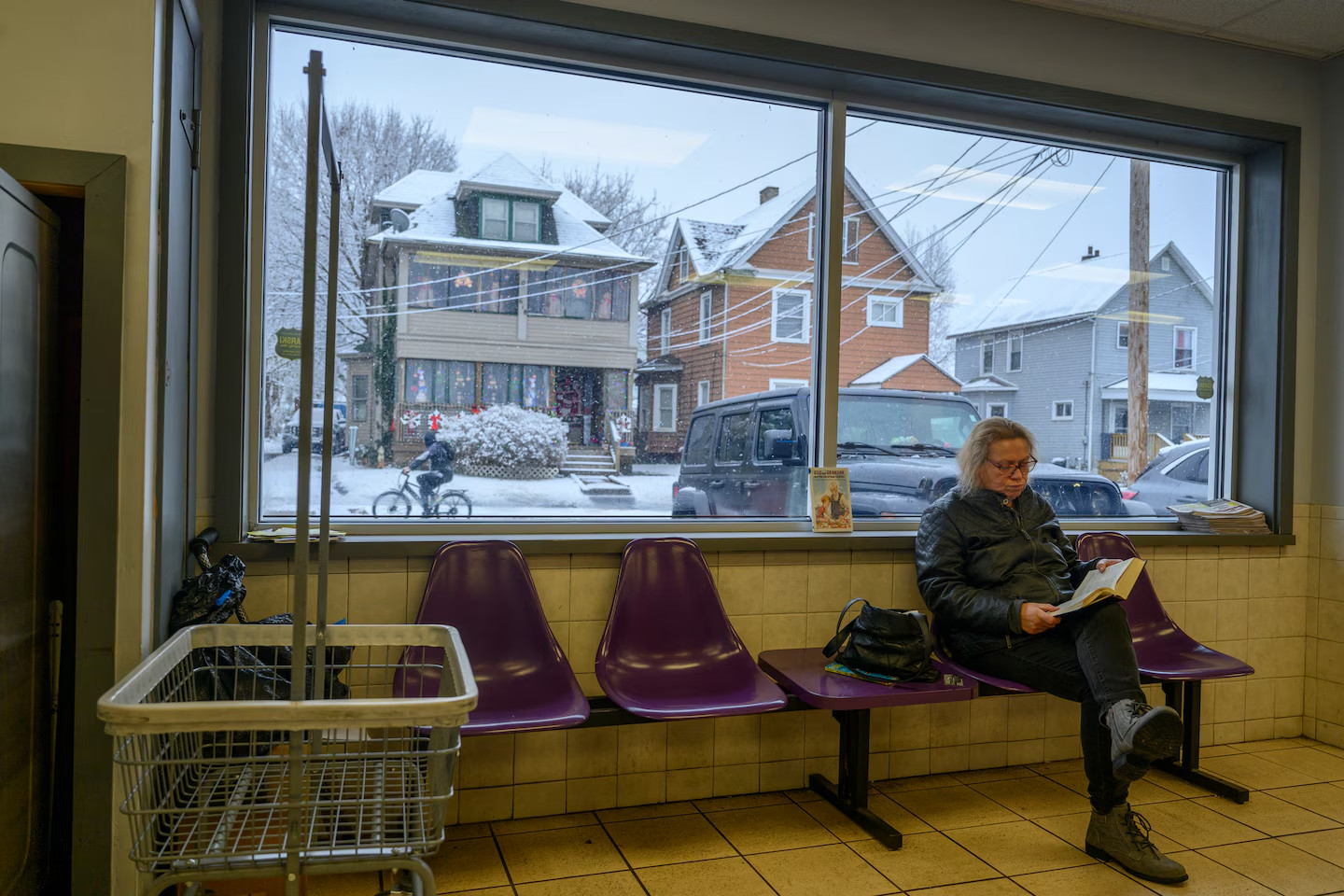
Mary Defrank reads her Bible at a laundromat in New Castle.
(Jeff Swensen for The Washington Post)
Fifty percent of voters from families with an income of less than $50,000 a year cast their ballots for Trump, according to the data, compared with 48 percent for Vice President Kamala Harris. Four years ago, President Joe Biden carried those voters by 11 percentage points; Hillary Clinton won them by 12 points in 2016 and former president Barack Obama by 22 points in 2012.
Now, low-income Americans who voted for Trump say they are counting on him to keep their benefits intact even while his Cabinet picks and Republican lawmakers call on him to reduce federal spending.
Elon Musk and Vivek Ramaswamy — whom Trump has chosen to lead a new nongovernmental advisory panel, the “Department of Government Efficiency” — have said they want to trim $2 trillion from the government’s annual budget, a cut that some experts say could be accomplished only by slashing entitlement programs. Trump’s pick for White House budget director was a key architect of Project 2025, a plan drawn up by conservatives to guide his second term that calls for steep cuts to programs such as food stamps. And GOP leaders in Congress and Trump advisers are considering significant changes to Medicaid, food stamps and other federal aid.
The uncertainty comes after last week’s high-stakes showdown in Congress over the federal funding bill. Lawmakers narrowly avoided a shutdown after agreeing to fund the government until March. House Speaker Mike Johnson (R-Louisiana) had unveiled a bipartisan bill to put off a shutdown, but Trump and Musk railed against what they said was unnecessary spending in the initial package.
“Everybody is on hyperalert,” said Tom Scott, the chief executive officer of Lawrence County Community Action Partnership, a social service agency that helps New Castle residents. “You have to be concerned because you don’t know which programs could be targeted” for spending reductions.
In a recent appearance on NBC News’s “Meet the Press,” Trump said any efforts by his administration to streamline the federal government would not impact entitlement programs such as Social Security.
“Americans of all backgrounds elected President Trump because of his plans to lower costs, end the financial drain of illegal immigrants on our healthcare system, and ensure that our country can continue to care for American citizens who rely on Medicaid, Medicare, and Social Security,” said Anna Kelly, a spokeswoman for his transition team.
Some longtime Democrats like Mosura said they initially struggled over whether to vote for Trump. They had believed Democrats were the most likely to help the poor and disagreed with Republicans on issues like abortion. But Mosura said she kept coming back to the conclusion that Trump would put Americans like her first and improve her economic prospects.
Mosura said she has been unable to find full-time work in her field and is planning to change her party affiliation to Republican. But she also gets anxious when she hears GOP politicians talk about reducing government spending.
“We helped get you in office; please take care of us,” Mosura said, shifting the conversation as though she were speaking to Trump. “Please don’t cut the things that help the most vulnerable.”
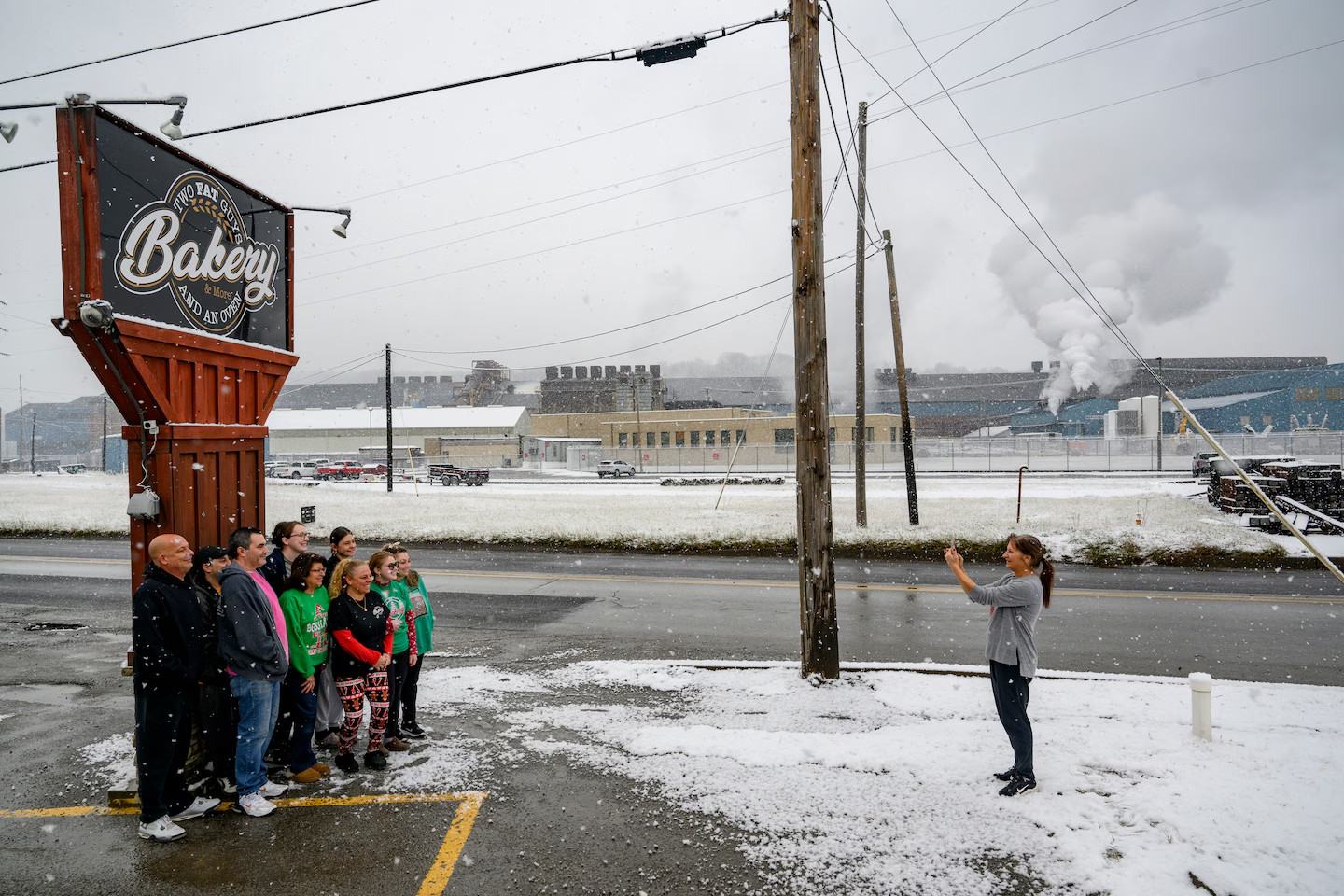
Employees of the Two Fat Guys and an Oven bakery in New Castle shoot a Christmas photo
(Jeff Swensen for The Washington Post)
‘Serious, serious trouble’
Located about an hour north of Pittsburgh, New Castle is the third-largest incorporated city in western Pennsylvania.
After it was founded around the turn of the 19th century, the city became a major destination for Italian immigrants. New Castle emerged as an industrial hub known for its tin mills in the 1800s. The new residents built a lively downtown filled with shops and bars.
New Castle was also home to a thriving labor movement that helped shape the city’s historically left-leaning politics. Before Trump won New Castle, the city had last backed a Republican presidential candidate in 1956, when voters narrowly supported Dwight D. Eisenhower (R) over Adlai Stevenson (D), according to Andrei Pagnotta, a resident who has spent years studying the region’s election results.
But the city changed dramatically as factories closed and younger residents moved to more vibrant urban areas. The busiest destinations downtown today are the 60-year-old Capitol Grill bar, which sells $2.75 Bud Lights, and Hazel’s Restaurant, where guests can get a stuffed pork chop dinner for $11.99. The city’s population of 21,000 is roughly half what it was during its peak in the 1940s.

Lewis Stiles Hoyt, an oil and coal baron, at the mansion built by his son in New Castle.
(Jeff Swensen for The Washington Post)

The former Shenango China Factory in New Castle.
(Jeff Swensen for The Washington Post)
Federal benefits have helped keep residents afloat, and today that safety net is deeply interwoven with daily life. The 8.5-square-mile city includes 10 public housing projects. About 60 percent of the houses in the city are rental properties, and federal housing vouchers help countless families afford rent. Many residents also receive Medicaid and food stamps.
Trump's second presidency
More than half of the Lawrence County Community Action Partnership’s $32 million budget comes from federal aid, said Scott, the organization’s leader. That helps it do things like shuttle low-income residents to medical appointments and offer rental assistance. Federal aid is also key in keeping New Castle’s children fed. About 90 percent of students come from low-income families and qualify for free school lunches, and many are sent home with food to eat over the weekend.
“It’s a very depressed area, so if our funding were to go away, and I have not heard it will, but if it were to go, we would be some in serious, serious trouble,” said Gregg Paladina, superintendent of the New Castle Area School District.
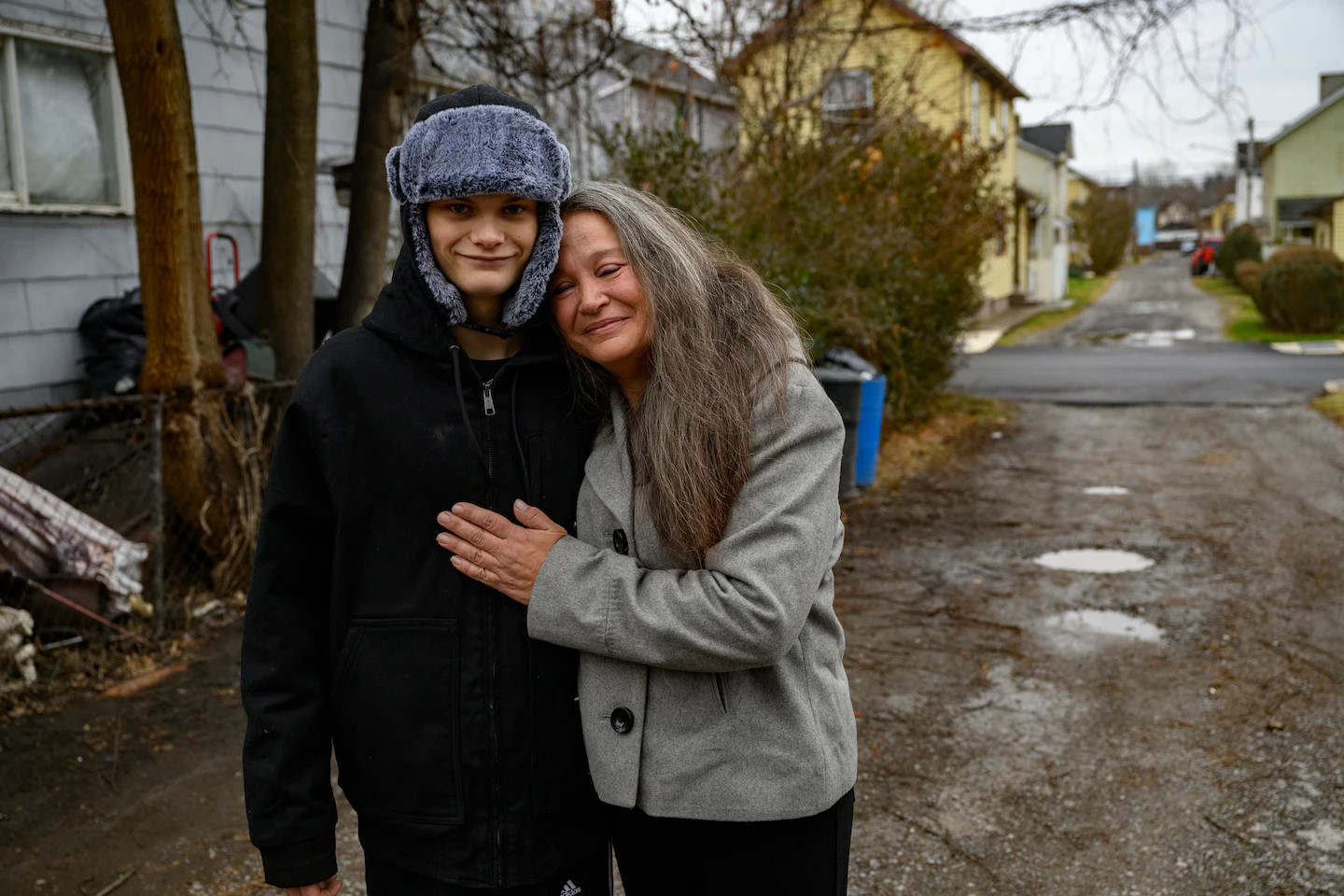
Lori Mosura with her son, Garrett Miller, in New Castle.
(Jeff Swensen for The Washington Post)
Milk or toilet paper
A decade ago, Mosura was a fervent supporter of the Clintons. She recalls meeting former president Bill Clinton in New Castle at a rally during Hillary Clinton’s 2008 campaign for the White House.
But the single mother said she began to drift away from Democrats as the party’s promises to help people like herself began to ring hollow. She said she’s been “suffering a lot” because of rising prices. Groceries she once thought of as staples — like soda — are now luxuries.
“People are struggling now more than ever, in this city especially,” said Mosura, who pays $375 a month for her apartment. She said she’s “prayed more in the past year than ever before” because of her mounting bills.
New Castle was a bastion for Democratic votes up until this year. But in larger Lawrence County, the shift toward the GOP has been ongoing. White, working class Americans were increasingly drawn to Republican candidates, in part because of their messaging on security and immigration.
According to Census data, White residents make up three-fourths of New Castle’s population, while Black residents account for 10 percent. The population also includes 10 percent of residents who identify as mixed race and five percent who are Hispanic.

Joseph’s Marketplace, a family-owned grocer in New Castle.
(Jeff Swensen for The Washington Post)
Lynne Ryan, chairwoman of the Lawrence County Republican Party, said Democrats lost the support of New Castle residents over their handing of illegal immigration and foreign aid. She said Trump was a skilled politician whom low-income voters found to be honest and relatable.
“Trump won’t cut necessary programs, and nowhere has he said he is cutting any of that,” Ryan said. “He is cutting bloated government. He is not cutting programs that work for the American people.”
City Administrator Chris Frye, a Republican and former mayor of New Castle, said he expects GOP leaders will push for some changes to how federal programs are administered. But Frye urged his party to show “empathy” when it comes to determining the actual benefits that people receive.
“I think it would be stupid to just take something away,” Frye said. “We would have mass chaos. Mass homelessness … so nationally, I don’t think it is going to be a situation where they are taking away from people.”
Detractors worry that New Castle residents will come to regret their votes.
“I have big concerns those who voted for him didn’t realize what they are doing and it’s going to affect their family and friends and probably themselves, too,” said Timothy Buck, chairman of the Lawrence County Democratic Party.
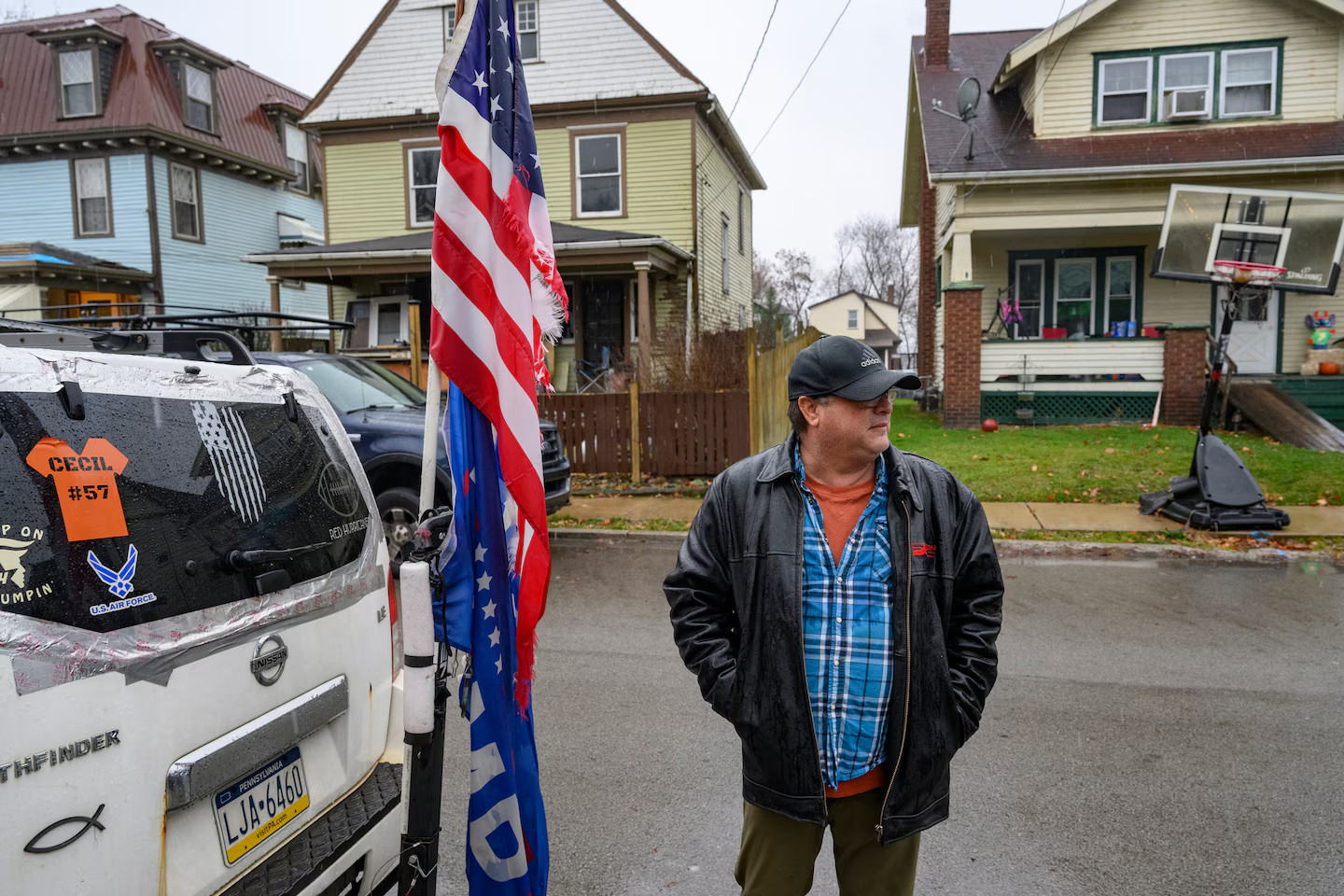
Steve Tillia shows off his Trump flag in front of his New Castle home.
(Jeff Swensen for The Washington Post)
‘Cutting the fat’
On the 100 block of Richelieu Street in New Castle’s Lower East Side neighborhood, many residents rely on some form of government assistance — and most people support Trump. More than a month after the election, Trump signs and flags were still planted in yards and on porches.
Steve Tillia, 59, receives $1,600 a month in Social Security disability payments and $300 in food stamps to support himself and his son. Tillia, who said he is unable to work after suffering from mini strokes, still drives around New Castle with a Trump flag anchored on the bumper of his SUV.
Tillia said he’s confident that Trump and GOP leaders will reduce spending by “cutting the fat” out of government — and not slashing benefits.
“It’s not cutting government programs, it’s cutting the amount of people needed to run a program,” he said. “They are cutting staff, which could actually increase the amount of the programs that we get.”

Richelieu Street on Dec. 20.
(Jeff Swensen for The Washington Post)
Tillia’s neighbor, Dawn Simmons, nodded her head in agreement. Simmons receives $900 a month in Social Security benefits and $171 a month in food stamps, and she also said Trump’s decisions may even lead to enhanced benefits in the coming years because he plans to “put Americans first.”
The neighbors on Richelieu Street said they are broadly supportive of Trump’s Cabinet picks, as well as Musk’s plans for the Department of Government Efficiency. Musk has been highlighting examples of what he considers government waste on X, his social media platform — at times pushing misleading information. Some of those examples have nonetheless resonated in New Castle.
“Why do we need to be studying cats in Russia?” asked Tillia, referring to a program that used cats to study spinal cord injuries.
New Castle residents who didn’t support Trump said they are dismayed that their community appears to have voted against its own self-interests.
As they folded clothes at the Colonial laundromat, Tom Jones, 86, and his 75-year-old wife, Lottie, said they are already hearing from parishioners at their church who worry how they will get by if federal spending is reduced.
“My fear is, they will get rid of Obamacare, and mark my words, this will just be the beginning of their troubles,” Jones said. “I want to say, ‘I told you so.’ … These people who voted for him didn’t look at the big picture.”
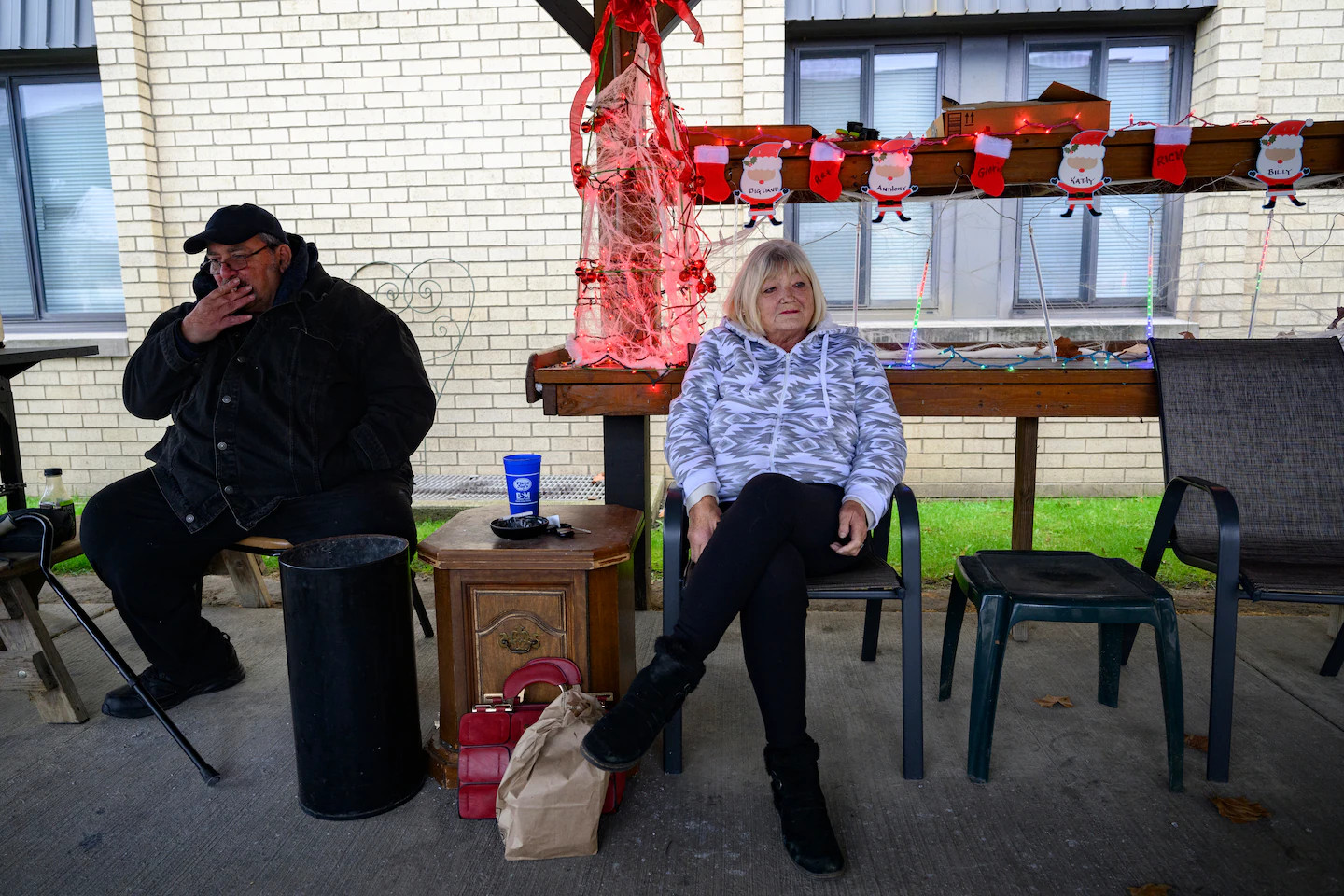
Kathy Davis at the Riverside Apartments smokers patio in New Castle.
(Jeff Swensen for The Washington Post)
But as Kathy Davis sat in the “smokers patio” at the Riverside Apartments, she said she is as confident as ever that Trump’s presidency will benefit her.
Davis, a retired artist, subsists on a monthly $1,300 Social Security payment and $75 in food stamps. She rents her studio apartment for $385 per month. Asked whether she worries that Trump’s agenda could hurt the poor, Davis said the incoming president is “too smart for that.”
“You can’t wipe out half of the population” of New Castle, Davis said. “We are old and tired and just want to be taken care of, and Trump has too much common sense, so I don’t think he is going to do anything to hurt us.”
Emily Guskin contributed to this report.
Trump’s second presidency
Follow live updates on the transition to President-elect Donald Trump’s presidency. We’re tracking the people Trump has picked or is considering to fill his Cabinet.
FBI: FBI Director Christopher A. Wray announced he would resign at the end of the Biden administration, stepping down before Trump takes office and can fire him after Trump announced he would nominate loyalist Kash Patel to serve as FBI director.
Health: Trump selected Robert F. Kennedy Jr., a longtime vaccine skeptic, to lead the Department of Health and Human Services. Here are some of his planned priorities, from vaccines to raw milk.
Justice Department: After former Congressman Matt Gaetz (R-Florida) withdrew his bid to be Trump’s attorney general, Trump announced that he plans to nominate former Florida attorney general Pam Bondi to the Cabinet role.
DOGE: Trump announced he is tapping Elon Musk and Vivek Ramaswamy to lead the “Department of Government Efficiency,” a new commission on cutting government spending and regulation. Here are 10 programs that could be on the chopping block and what we know about DOGE.
What else could change: Trump promised executive orders to impose new tariffs on all imported goods from China, Mexico and Canada. Trump has promised to close the Education Department, and many Republicans are with him. Here’s what that would mean.
- Tracking Trump’s picks for his Cabinet and administration
- Trump wants federal workers back in the office. It may be a tall task.
- Trump’s top border adviser says he will bring back family detention
- How to have a Trumpy Christmas, and make the president-elect richer, too
- Trump’s election sparks fight over judicial retirements, new judgeships
- Trump’s Panama Canal threats designed to scuttle China influence
- For some Latinos, ‘prosperity gospel’ led them to Trump
- Who controls Greenland, and why does Trump want to buy it?
- Trump signals plans to use all levers of power against the media
- How Trump and Musk set off the shutdown crisis — but got little in return
- Senate passes spending bill to avert government shutdown, sending to Biden
- Why Republicans will probably be blamed for a shutdown
- Trump’s claims of a mandate run into reality of narrow majorities
- 5 food-related policy ideas for the incoming administration
- 6 policies stripped from GOP bill after Trump, Musk rebellion